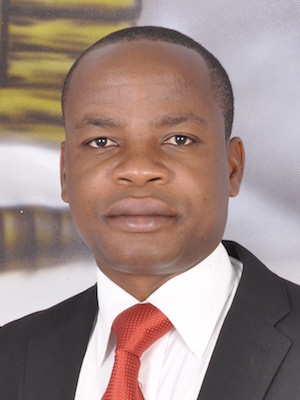 Edwin P. Mhede
Edwin P. Mhede
Deputy Permanent Secretary
Ministry of Industry, Trade and Investment, Tanzania
MA (’10) & Ph.D. (’18)
Please tell us about your career path so far. What is your area of specialization and how did you come to work in this area?
As an undergraduate, I pursued a B.Sc. in Agricultural Economics and Agribusiness at Sokoine University of Agriculture (SUA), Morogoro, Tanzania. I wanted to use what I learned at SUA, particularly the theory of the firm in policy analysis. I started my professional career as Economist II in August 2006 with the Ministry of Industry, Trade and Marketing (MITM) in Dar es Salaam, which has now been renamed as the Ministry of Industry, Trade and Investment (MITI) in Dodoma, Tanzania. Joining MITM, which was through a very competitive interview, and working for the Department of Industry Development of MITM was optimal to satisfy my earlier determination to make use of my knowledge and to be involved in something industrious. As Economist II, I was assigned the duty of conducting firm-level surveys of industrial production to collect industrial statistics to facilitate policy analysis and coordination to inform the private sector-led and government-supported industrial investment as well as monitoring the performance of the sector in Tanzania.
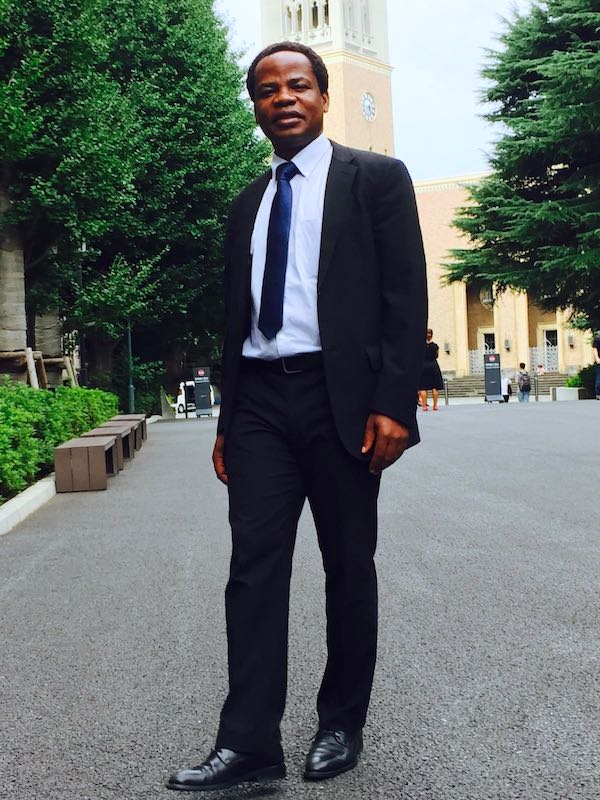
Edwin at the entrance of Waseda University’s main campus.
While working at the ministry, I had the opportunity to lead Tanzania’s technical working groups to the discussion on the regional industrialization and trade agenda in the East African Community (EAC) and Southern African Development Community (SADC). Also, during my tenure, I have been fortunate to serve (on a short-term basis) in other organizations within Tanzania’s public sector. Some examples include the Ministry of Finance and Planning (MoFP) and Ministry of Agriculture (MoA). Accepting a call to serve outside the public sector, I was engaged as a Short-Term Consultant (STC) and Research Collaborator with The World Bank Group in 2010 and Policy Research for Development (REPOA) from 2012 to 2014, respectively.
In carrying out my policy advisory practices, it became clear that I needed to strengthen my conceptual and practical understanding of economics. Thus, in 2007, I applied for the International Development Studies Program (IDS) graduate course at GRIPS and was accepted to start my studies in August 2008. I completed the master’s program in March 2010 and returned home with a passion for doing more. Using the knowledge acquired in Japan, I initiated a Kaizen project to support product quality and productivity improvement in the manufacturing firms. The project was a joint effort between the Government of Tanzania and the Japan International Cooperation Agency (JICA). As a result, in 2012, I was promoted to be the Head of the Tanzania Kaizen Unit (TKU) to spearhead the institutionalization and dissemination of a Kaizen training program nationwide. I worked for less than a year in this position before being seconded to the then President’s Delivery Bureau (PDB) of the Tanzania government. In 2013, I was lucky to receive a scholarship to pursue the doctoral course at GRIPS. During doctoral training, my rigorous coursework and research concentrated in Development Economics of Industrial Development in developing countries. My occupation in the public sector and training background have given me an opportunity to engage in many impactful assignments and to tackle various tasks to contribute to the economic development of Tanzania.
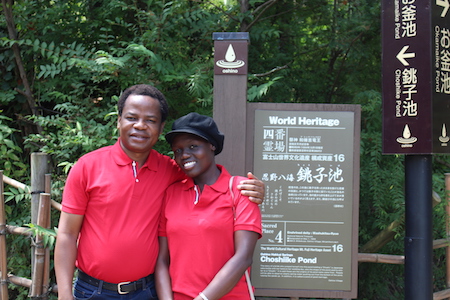
With his wife at the “mysterious springs” Osino-Hakkai in Yamanashi prefecture
After defending my dissertation successfully in February 2018, I returned to Tanzania to assume my regular duties at MITI while at the same time revising the dissertation. I was assigned to lead a technical team of government officials in the analysis of the import and utilization of industrial sugar by food and drugs manufacturing firms in Tanzania. In May 2018, I was appointed to serve as an Acting Assistant Director in charge of Enterprise Promotion in the Directorate of Small and Medium Enterprises of MITI. I served in this post for about one and a half month. Then, in mid-June 2018, I left MITI to join Tanzania Agricultural Development Bank (TADB) as a Manager of Research and Advisory Department following a competitive recruitment. Also, on 14th July 2018, I was appointed by the Minister for Water and Irrigation as a Member of Board Directors of Dar es Salaam Water and Sewerage Authority (DAWASA). Having served at TADB for only about six weeks, on 24 July 2018, I was appointed by H.E. Dr. John P. Magufuli, the President of the United Republic of Tanzania, to serve as a Deputy Permanent Secretary in the Ministry of Industry, Trade and Investment (MITI). Indeed, this appointment means a U-turn in my career path as I have now returned to my former office but the professional experience I have accumulated throughout the time I worked in various organizations signifies a new episode in my career.
You have just been appointed by the Tanzanian President as Deputy Permanent Secretary in the Ministry of Industry, Trade and Investment. What are your main roles and responsibilities?
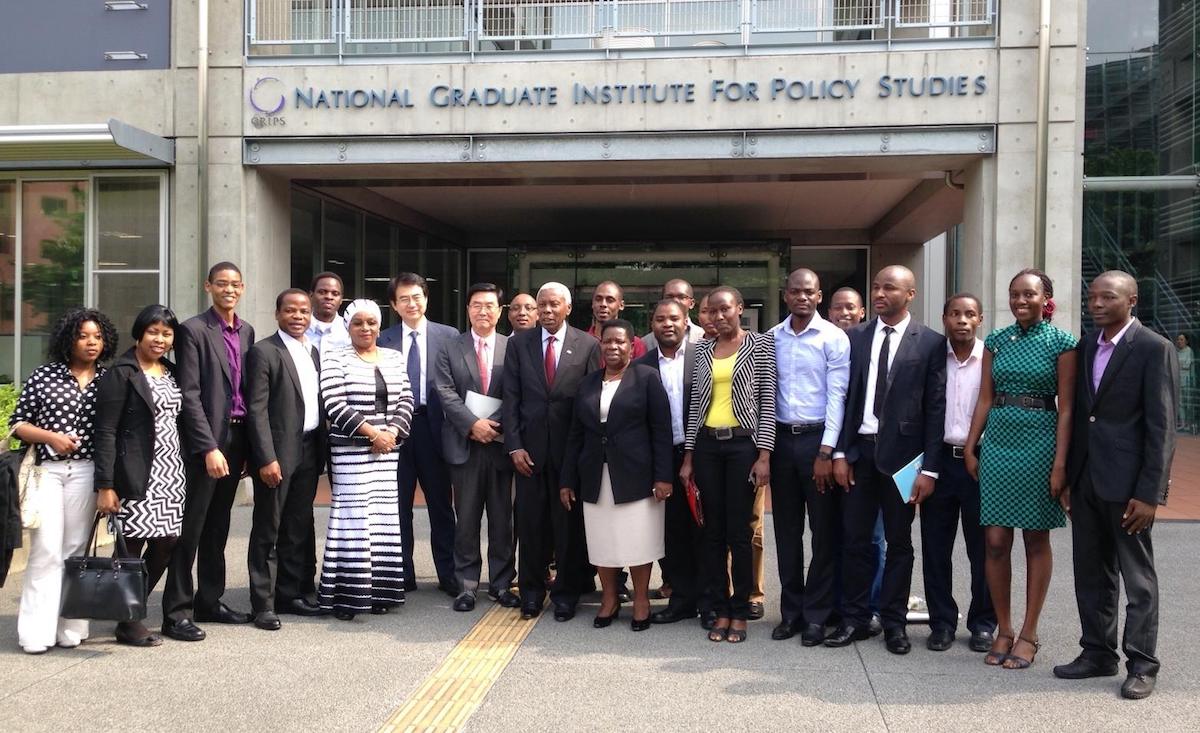
Tanzanian Vice president, Dr. Mohammad Gharib Bilal, with our African students after his lecture at the Special GRIPS Forum in May 2014.
As Deputy Permanent Secretary, I am responsible for promoting trade integration, development of domestic trade, and investment portfolio. In trade integration portfolio, I am responsible for formulating, coordinating, and negotiating trade policy to position Tanzania in bilateral, regional, and multilateral economic groupings (e.g., WTO, EAC, SADC, EAC-SADC-COMESA Tripartite, CFTA, AGOA, EPA, and EBA). While in the domestic trade my fundamental responsibility is to oversee the execution of marketing policy (for both the manufactured and agricultural commodities), in the investment promotion I am responsible for supervising the implementation of investment promotion policy aimed at improving the business environment to speed up the rate of investment in various sectors of the economy. Moreover, I am overseeing and nurturing the performance of nine statutory organizations under MITI (e.g., TBS, TANTRADE, BRELA, TIC, FCC, COSOTA, FCT, CBE, and GS1). Due to the coexistence of industry and trade policy, therefore, another role that I am mandated to discharge is bridging the implementation of these two policies. Other equally important duties are developing and strengthening productive relationships of MITI with all key stakeholders such as other government ministries, departments, and agencies (MDAs), academia, research organizations, the private sector, and development partners.
In your current capacity, what do you see as the main opportunities and challenges for Tanzania over the course of the next five to ten years?
Eradicating income poverty (in the short-term) and creating wealth (in the medium- and long-term) are two of the top economic challenges in Tanzania. This is because everybody deserves to earn a decent living and have access to public goods and services that are geared toward the development of a vibrant and pro-poor industrial sector. At the same time, citizens in rural areas need agricultural transformation as well as the development of non-farm income sectors (including the labor-intensive rural industrialization and trade) to create jobs, sound financial inclusion, and social services. For this to happen we need, therefore, to provide appropriate hands-on-skills (e.g., underlying business and management skills) and create a conducive environment for doing business and maintaining their rural livelihoods areas instead of migrating to urban cities.
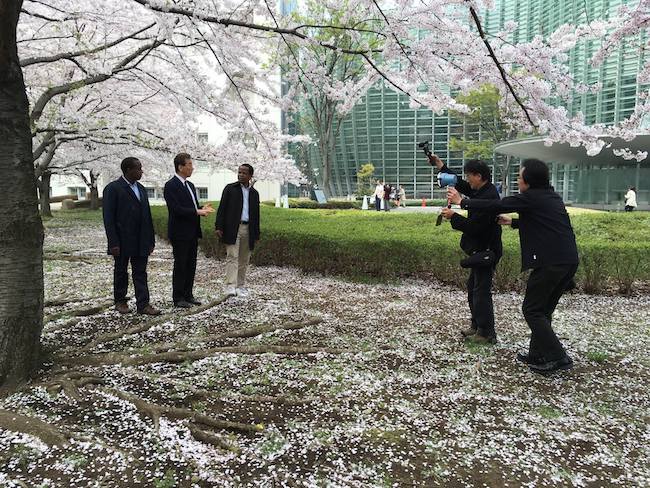
Filming a promotion video for the “Hideyo Noguchi Africa Prize” with Dr. Kiyoshi Kurokawa at the GRIPS campus in April 2016
Opportunities are humongous. Here, I mention only a few. First and foremost, the existence of action-oriented commitment from the 5th government top leadership in promoting industrial and trade development. In this regard, my work becomes doable because the support from principals is guaranteed. Second, at MITI, we have a good management team with people from various backgrounds (e.g., academia, public sector, and business). Third, the country is endowed with peace and tranquility among Tanzanians, which is a central input to permit proper functioning of other factors of production. Fourth, there is an abundance of natural resources, which we are commoditizing and using in industrialization. Indeed, as we are overseeing the policy design and implementation of publicly- and privately-owned industrial and infrastructure projects, at the end of the tunnel, that is, by 2025, Tanzania will be a middle-income country.
What are some of the biggest challenges you face in your work? And what have been the most interesting or rewarding aspects of your career thus far?
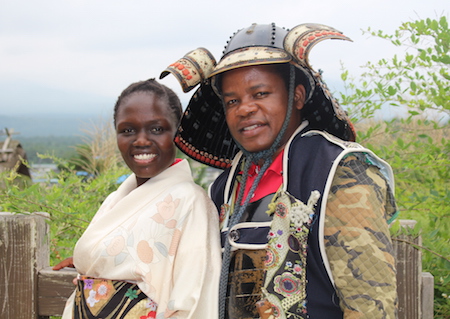
Dressed up as a real samurai at the world heritage site Shirakawa-go
Since I joined the public sector, I have been genuinely impressed by some of the diligent staff members who work tirelessly to support the proper functioning of MITI. Also, I have seen local experts and those who specialize in industrial, trade, and private sector development. Countless efforts in the past and present have been emphasized to reinforce the existence of this brainpower with institutional memory. It is, however, a bit of a challenge to uphold and further promote this issue under the continuously changing circumstances. I also have found it a challenge for me to reach out to broader stakeholders, especially those who are not particularly skillful in how to develop and manage industry and trade. Specifically, on the private sector side, most indigenous entrepreneurs are unfamiliar with firm-level basic production and business management skills. In the public sector, there are glitches of insufficient analytical skills often coupled with a passive learning attitude and lack of readiness to learn from successful cases. Inadequate communication among some of the public officials also poses a problem sometimes.
One of the most significant rewards of my current job is that I am serving the sector that I love most and that I have chances to meet various professionals and practitioners as well as my mentors. I learn from most of them and, indeed, they give me enormous encouragements. Others are inducing soul-teasing experiences that make me remain alert. I have been blessed with many such encounters and I am always grateful.
You did both your master’s and Ph.D. at GRIPS. How do you compare these experiences?
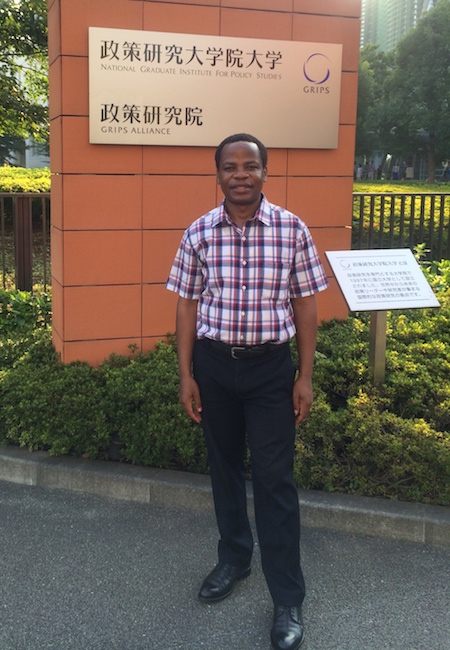
Edwin in front of the GRIPS campus
During my master’s training, I was exposed to intermediate economics and econometrics courses and well as related research analysis skills. Such a training level is vital for policy analysis. However, during Ph.D. training, I took advanced courses in economics, economic history, and political science. The combination of courses proved to be unique as on its own. For example, I could learn how the scientific revolution (henceforth industrious revolution) ignited the industrial revolution in Europe. I learned that a similar pattern was followed by North America before spreading to East Asia. During this time, I also strengthened my research skills by conducting micro-level empirical studies (on productivity improvement in the private and public sector) for my doctoral dissertation. Moreover, I had a chance to meet great minds and thus I could make new peers in the field of development economics.
What led you to GRIPS/GSPS? What is the most important thing you got out of your studies here, and how has your experience at GRIPS prepared you for future endeavours?
As pointed out earlier, during my undergraduate I studied agricultural economics and agribusiness at SUA. While the underlying principles of economics are similar, their application is, however, different depending on the sector. During my early service to MITI, I realized that if I want to continue as an industrial and trade policy analyst, I would need further qualifications in industrial economics. While searching for an appropriate university, in 2007 JICA invited qualified Tanzanians to apply for a master’s degree scholarship program which was jointly organized by GRIPS and FASID. I looked at the curriculum, and it became clear that I was in the right direction. After passing the examinations, I was admitted to GRIPS for graduate studies in October 2008. I met distinguished professors at GRIPS who clarified further the curriculum and encouraged me to do my best. So, the IDS program was perfect for me.
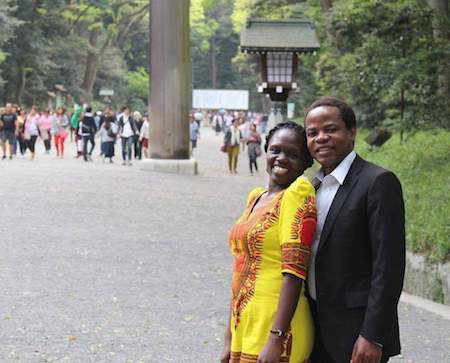
Edwin and his lovely wife at Meiji Shrine.
When I graduated with my master’s degree, I felt I shouldn’t lose the momentum. But, I had no option other than returning to Tanzania for a while. While in Tanzania I was privileged to conduct empirical studies under the close mentorship of Professors Testsushi Sonobe and Keijiro Otsuka. Through this continuing research engagement between professors and I, my determination to study for an advanced degree remained alive. I thus applied for and obtained a MEXT scholarship and hence, I came back to GRIPS for doctoral studies in October 2013.
I got many things out of my time at GRIPS. First, is, of course, the training in scholarly work. Honestly, I was not an average scholar in undergraduate. The training experience at GRIPS made me appreciate that I still needed to accumulate plenty of knowledge and skills. Second, learning from other fellow scholars and learning about economic policy design in Japan and other East Asian countries. Third, I strengthened the network of great friends from around the world. The list is countless. Such friends are valuable assets now and in my future endeavors.
How do you maintain a balance between your work and the rest of your life? And what is your favorite thing to do when you are not working?
This is a very thought-provoking question. I try to balance work and personal life. Nonetheless, it remains one of the challenges. I work because I am honored to serve, and I appreciate what I’m doing. In many cases, immediately after work hours, I go home to see my lovely wife (Rachel) and children (Edward, Edson, and Edriel) before they go to bed. During the weekend, I prefer going to church with my family where I sometimes teach the gospel and sing holy music. After church service, I stay at home with my family. While at home, I enjoy helping our children to do their school homework and clearing our house. Also, I visit our small farm in Nyatanga village, which is about 80 km from my home in Kigamboni, where we commercially cultivate pineapples, watermelon, cassava, and maize.
Moreover, occasionally my wife and I go jogging to maintain our health. There are many more things that I love to pursue. However, my current job as a full-time Deputy Permanent Secretary to the Ministry makes me busy and does not leave much extra time to do all those things.
What are some of your fondest memories of your time spent at GRIPS? And what do you miss about Japan?
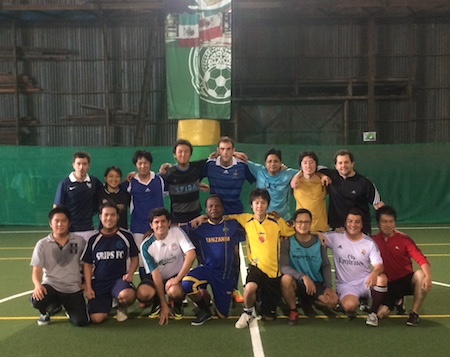
The GRIPS soccer team.
The parties, in the cafeteria, at JICA Centre at Nishihara, and IH1 and IH2 of GRIPS International House in Nakano, and church service at the Tokyo International Church of Seventh-day Adventists (TIC) in Meijijingumae. Eating and talking with friends from all over the world is the best thing I had. Also, I miss our jogging club which was composed of Yuki Higuchi, Julius Favorite, Kefyalew Endale, and I. After class and self-studies, we used to run, about 10 km, from the GRIPS campus to our residence in Nakano. Of course, I miss our team at the GRIPS fitness center. I enjoyed doing exercise, in the GRIPS fitness center, with many friends. I can recall few of them including Nicolaus Shombe, Fabien Majoro, Wendeline Kibwe, Fredrick Manang, Masaru Nagashima, and occasionally Fransicso Mugizi.
If you could give one piece of advice to anyone considering studying at GRIPS what would it be?
GRIPS is a unique set up at the very heart of Tokyo, where graduate students from overseas and Japan can study together at a very high level in English. If you happen to have an opportunity to study at GRIPS, grab that chance. GRIPS is small but cozy. These features make that you easily get connected with other students and great professors. In short, GRIPS offers excellent opportunities. Do not miss them. Also, try to get involved in Japanese society and culture beyond the campus while you are in Japan.
How would you like to maintain involved with the School? What do you expect from GRIPS as an alumnus and do you have any suggestions on how to further utilize the GRIPS alumni network?
Firstly, allow me to express my sincere gratitude to the GRIPS Alumni Office for its efforts to keep each other posted. There are a few ways I’d like to be involved with GRIPS. First, as I pointed out earlier, I am serving as the Deputy Permanent Secretary with the Ministry of Industry, Trade and Investment (MITI). I’m sure there are things we can do together in policy analysis studies. The doors for future collaboration are open. Indeed, I look forward to working together with any GRIPS alumni. Secondly, I have worked in the public sector for over 12 years. Thus, I consider myself as a seasoned policy professional. I am happy to volunteer my time and experience to teach university students as I believe the knowledge acquired at GRIPS needs to be spread to others so that GRIPS can be further known to the world. I love researching and teaching. I expect, therefore, that the GRIPS Alumni Office will keep us connected as we are interested to know more about what’s going on to support each other.





